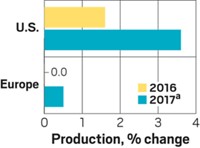Advertisement
Grab your lab coat. Let's get started
Welcome!
Welcome!
Create an account below to get 6 C&EN articles per month, receive newsletters and more - all free.
It seems this is your first time logging in online. Please enter the following information to continue.
As an ACS member you automatically get access to this site. All we need is few more details to create your reading experience.
Not you? Sign in with a different account.
Not you? Sign in with a different account.
ERROR 1
ERROR 1
ERROR 2
ERROR 2
ERROR 2
ERROR 2
ERROR 2
Password and Confirm password must match.
If you have an ACS member number, please enter it here so we can link this account to your membership. (optional)
ERROR 2
ACS values your privacy. By submitting your information, you are gaining access to C&EN and subscribing to our weekly newsletter. We use the information you provide to make your reading experience better, and we will never sell your data to third party members.
Business
Texas Hold 'Em
Petrochemical producers sat down in Texas to discuss how a global marketplace is upping the ante
by Alexander H. Tullo
April 9, 2007
| A version of this story appeared in
Volume 85, Issue 15

THE PETROCHEMICAL WORLD gathered late last month in Texas for the National Petrochemical & Refiners Association's (NPRA) international petrochemical conference in San Antonio and also for related meetings in Houston. If these events could be distilled to a single word, it would be "globalization."
It was globalization both in the traditional sense of international trade and U.S. expansion overseas and in the newer sense of established companies bracing themselves for formidable competitors from the developing world. The word also captured the scarcity of global hydrocarbon resources faced by petrochemical producers, as well as regulations that are becoming increasingly global.
Some 3,300 delegates attended the NPRA meeting, a slight increase over the 3,250 who attended last year. Reflecting the increasingly global flavor of the industry, some 40% of the attendees came from outside the U.S.
Also in keeping with globalization, NPRA's organizers have recently favored chemical heavyweights from emerging petrochemical markets to address the conference. This year, José Carlos Grubisich, chief executive officer of Braskem, Brazil's largest petrochemical maker, gave the keynote address.
Grubisich cautioned the audience not to ignore Latin America's petrochemical industry. He said the region enjoys strong growth in petrochemicals as well as large reserves for oil and natural gas that are mostly untapped. "Whenever we talk about competitive resources in our industry, we immediately focus on the Middle East and Asia. Of course, those regions and those countries are setting the trend in our industry," he said. "But Latin America can also play a role in claiming resources for the development of the petrochemical industry."
Bj??rn Lomborg, adjunct professor at the Copenhagen Business School and author of the controversial book "The Skeptical Environmentalist," addressed the gathering about the costs of the Kyoto protocol versus the benefits of stemming climate change. He cited studies claiming that the Kyoto protocol would have a total cost of $15 trillion over the next 100 years. In return, he claimed, the consequences of global warming would be delayed by about five years.
"The guy in Bangladesh who has to move his house in 2100 can wait until 2105," he said. He suggested that the money could be better spent elsewhere, such as on AIDS, hunger, and clean water.
NPRA's audience of petrochemical executives was quite receptive to Lomborg. In an address at the DeWitt World Petrochemical Review in Houston a week earlier, Lyondell CEO Dan F. Smith praised Lomborg and cited some of the same examples. "I'm not a greenhouse gas denier," he said. "My point is that we have a responsibility to consider all sides of the issue before we risk doing more harm than good."
Also at NPRA, Alexander Graf Lambsdorff, a member of the European Parliament, outlined the basics of REACH—regulation, evaluation, and authorization of chemicals—a series of regulations to be rolled out in the European Union later this year that will require documentation attesting to the safety of any chemical on the market.
REACH could also spread worldwide as companies adopt the standard globally and as other jurisdictions model their own regulations after it, Lambsdorff predicted. REACH will be the yardstick by which companies' commitment to the environment will be measured, he said. "Your companies may run into REACH or REACH-like regulations in the not-so-distant future."
The Texas conferences also considered one of the greatest challenges confronting the petrochemical industry: the rising prices of feedstocks. In an address to the Chemical Market Associates World Petrochemical Conference in Houston, the week before the NPRA meeting, Sherman J. Glass Jr., senior vice president for basic chemicals, intermediates, and synthetics at ExxonMobil, gave his company's outlook for oil and natural gas.
Global energy demand will increase 40% by 2030, reaching 325 million barrels per day on an oil-equivalent basis, Glass predicted.
Glass added that oil, gas, and coal will still meet 80% of the world's energy needs in 25 years despite double-digit growth in alternative energy platforms such as solar and wind power. "This is because they are affordable and reliable," he said.
But Glass admitted that the petrochemical industry will increasingly compete with other sectors, such as transportation, for access to hydrocarbons. If chemical companies want to remain competitive, he said, they will need to increase their ability to process a wide variety of feedstocks, such as heavier and lower quality oils. "Clearly, feedstock flexibility and nimbleness will enhance one's ability to capitalize on this changing energy world," he said.
Latin America
Brazil's Braskem Steps Toward More Dominant Role In The Region
Braskem, currently Brazil's largest chemical maker, has big ambitions. It aims to be one of the world's top 10 petrochemical firms, in terms of stock market value, by its 10th anniversary in 2012.
In his keynote address to the National Petrochemical & Refiners Association conference in San Antonio, Texas, late last month, the company's chief executive officer, José Carlos Grubisich, laid out some audacious steps it is taking to get there.
Along with fellow Brazilian firms Petrobras and Ultrapar, Braskem recently announced the acquisition of Brazilian oil refiner, fuels distributor, and petrochemical company Ipiranga for $4 billion. Ultrapar and Braskem will split the fuels distribution business. Braskem and Petrobras will split the petrochemicals business, taking 60% and 40% shares, respectively. The deal will also give Braskem control of Copesul, an ethylene cracker in the southern state of Rio Grande do Sul.
The roughly $4.2 billion in sales from Ipiranga and Copesul will boost Braskem's annual sales to $9.9 billion. Braskem says the deal will give it more than 50% of the Brazilian market for polyethylene and polypropylene and create overall cost savings of $750 million.
Grubisich told C&EN that his long-term plan is to take control of some of Petrobras' petrochemical holdings as well. These holdings include its 36% share of Copesul and the polyethylene maker Petroquímica Triunfo. In return, he said, Petrobras will add to its 10% stake in Braskem.
Braskem will shell out about $1.1 billion to complete the Ipiranga deal. But because Ipiranga and Copesul have little debt of their own, Grubisich said, Braskem will have the financial capability to continue with its expansion plans.
These plans include a polypropylene joint venture being built with Petrobras and scheduled to start up next year in the state of São Paulo. Braskem is building a similar plant at its complex in Camaçari, to be completed by 2010.
It is also teaming up with Venezuelan state oil company PDVSA to build a polypropylene plant by 2009 and an ethylene and polyethylene complex by 2011, both in Venezuela. "We strongly believe that those projects can be as competitive as the new projects that are being developed in the Middle East and Asia," he told the NPRA audience.
In addition to chemicals based on traditional oil and gas feedstocks, Braskem is also investigating those based on biomass. The company is building a pilot plant for converting ethanol into ethylene and propylene, which would be used to make "green" plastics. Braskem is working on a new catalyst technology that can improve yields and reduce the energy required for the reaction.
Grubisich admitted that the method won't be a cheap route to polyethylene. "We do not need right away to have a very low cost position," he said. "We think that this green polymer might get a premium over the traditional material."
- Latin America
- Brazil's Braskem Steps Toward More Dominant Role In The Region




Join the conversation
Contact the reporter
Submit a Letter to the Editor for publication
Engage with us on Twitter